Homeless And Broke Woman Gets A Place To Stay And Financial Support From Her Sister, But Is Angry Because She Won't Take In Her Dog
One Reddit user, Legitimate_Mud2287, wants to know whether she's an a-hole for refusing to let her sister move in with her dog after her sister became homeless. Legitimate_Mud2287 disclosed that she has a five-person household consisting of three kids aged six, nine, and twelve, and her husband.
Her younger sister recently became homeless and needed a place to stay with her one-year-old son and her dog. According to Legitimate_Mud2287, she's the only hope her sister has because their family has a lot of unresolved issues.
Legitimate_Mud2287 said her sister admits that she doesn't know how long she will stay, and there's no foreseeable future for her to get her own place soon, as she works only part-time and isn't earning enough to save.
Legitimate_Mud2287 doesn't have a problem accommodating her sister and her nephew. However, she has made it clear that she doesn't want to house her sister's dog.
Apart from the fact that she has cats and the dog has attacked a cat previously, Legitimate_Mud2287 simply doesn't like dogs and isn't interested in housing one. She also thinks her sister shouldn't have gotten the dog in the first place because she was never financially stable.
When Legitimate_Mud2287 told her sister that she couldn't move in with her dog, her sister was upset, called her heartless, and questioned why she wanted her to get rid of her son's "baby." Taking to the AITA subreddit, Legitimate_Mud2287 asked whether she's an asshole for not wanting her sister to move in with the dog.
Here's what the AITA community members had to say.
Here's how it started.
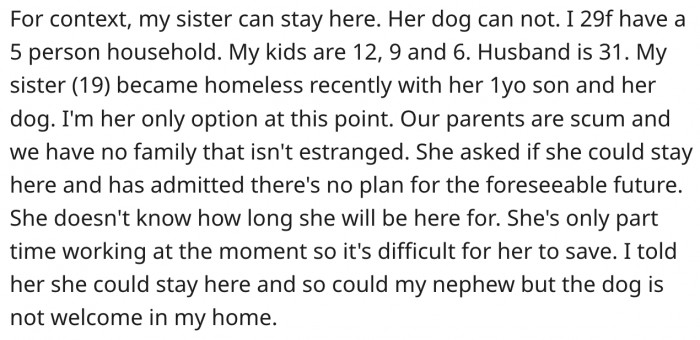
She doesn't want the dog to stay.
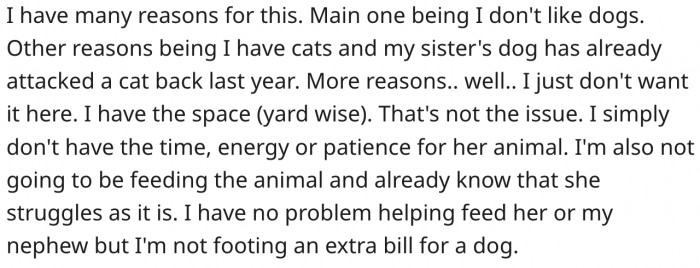
The sibling was heartbroken, but here's what Reddit thinks.
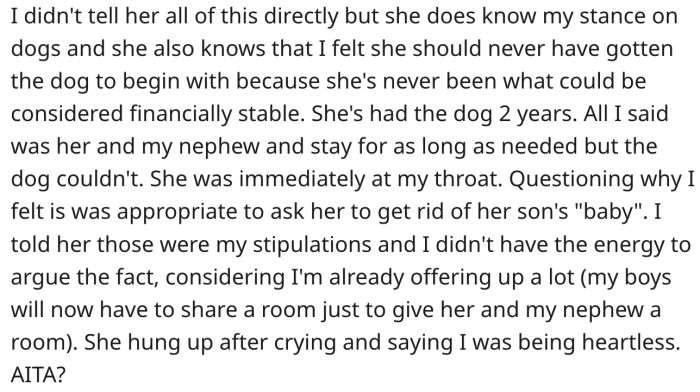
The Emotional Dynamics of Pet Ownership
In situations where pet ownership conflicts with housing arrangements, the emotional implications can be profound. The struggle between familial obligations and the attachment to a pet often leads to significant distress for pet owners.
Research from the American Psychological Association indicates that the bond between humans and their pets is rooted in emotional attachment, akin to familial relationships. This bond complicates decisions about housing and support when a pet is involved.
Understanding the Complexities of Family Support
Family support can be a double-edged sword, especially in situations involving financial hardship and pet ownership. Research published in the Journal of Family Issues indicates that financial stress can strain familial relationships, leading to feelings of resentment and obligation. The sister's refusal to take in the dog may reflect her own boundaries and limitations, which are crucial for maintaining healthy family dynamics.
Understanding the complexities of these dynamics is vital for fostering supportive relationships without overstepping boundaries.
1. Since it puts her cats at risk, she's not being heartless.

2. Her sister should rehome the dog.
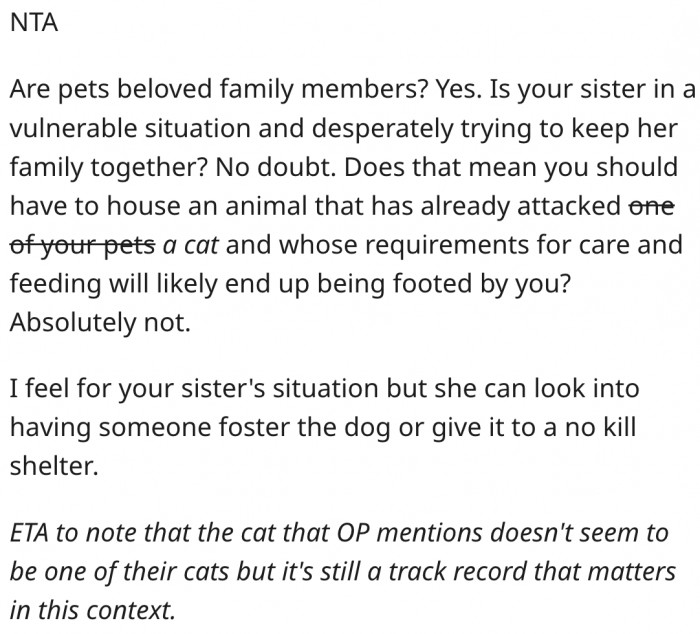
3. There are at least six reasons she's not an ahole.
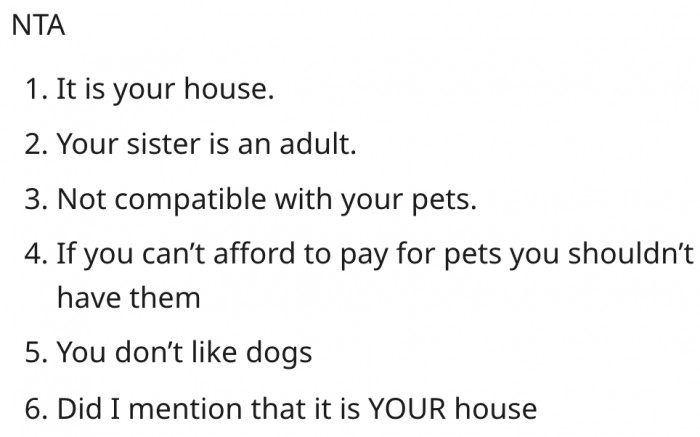
Moreover, the emotional response of the woman in this case reflects a deep-seated fear of abandonment, which can be exacerbated by financial instability. According to studies in attachment theory, individuals with anxious attachment styles may experience heightened anxiety when faced with potential separation from loved ones, including pets.
This anxiety can cloud judgment and create difficulties in making rational decisions about living arrangements.
Emotional responses can be heightened in situations involving family pets. A clinical psychologist notes that pets often represent more than just animals; they can symbolize stability, love, and responsibility. When a family member cannot take on a pet due to their own circumstances, it can evoke feelings of guilt and inadequacy.
Addressing these emotions is essential for maintaining self-compassion and understanding the limits of one’s capacity to help others.
4. Her sister isn't in the best position to own a dog.

5. Her sister should find a friend to adopt the dog.

6. Humans are a priority in this case.

Understanding the Role of Attachment
Attachment theory provides valuable insights into the emotional responses observed in pet ownership conflicts. Pets often serve as secure bases for their owners, offering emotional support and stability.
Research shows that when individuals face threats to these attachments, such as the need to rehome a pet, it can trigger profound feelings of loss and distress. A study published in the Journal of Personality and Social Psychology emphasizes the significance of these bonds in shaping emotional well-being.
The Importance of Setting Boundaries
Setting boundaries is crucial for maintaining healthy family relationships, especially when it comes to support. Research in family therapy emphasizes that clear boundaries can prevent feelings of resentment and obligation from arising. Encouraging open discussions about these boundaries can foster a more respectful environment.
When family members understand each other’s limits, they can offer support without compromising their own needs.
7. She should be more concerned about her household.

8. Not wanting a dog in her home is a right.

9. It's irresponsible to own a dog when you're not financially stable.

Additionally, the stress of financial instability can compound emotional reactions, making it difficult for individuals to prioritize their needs effectively. Studies in the field of psychology indicate that financial stress can lead to impaired decision-making and increased emotional reactivity, which can complicate situations like this.
Understanding these dynamics can help individuals navigate their emotions more effectively and seek solutions that honor their attachments while addressing practical concerns.
Families often have unspoken expectations about support, which can lead to conflict. According to Dr. Michele Gelfand, a cultural psychologist, "When family members fail to communicate their needs, it can lead to misunderstandings and resentment." Open communication about needs and limitations can help avoid these issues and foster a more supportive atmosphere. Dr. Pepper Schwartz, a sociologist, adds, "Addressing these expectations directly can relieve emotional burdens and create healthier family dynamics."
10. She's not obligated to help the dog.

11. Beggars can't be choosers.
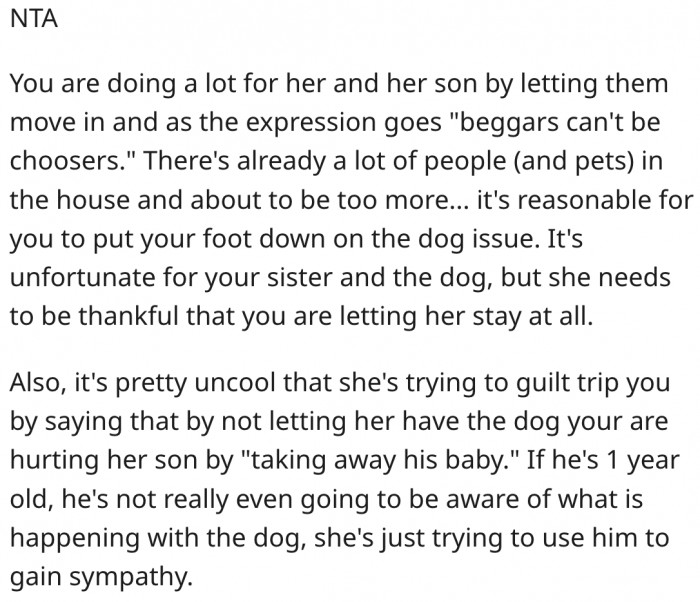
12. Her sister should be more focused on getting a job.

Strategies for Managing Emotional Responses
When faced with difficult decisions regarding pets, it's essential to manage emotional responses effectively. Techniques such as mindfulness and cognitive restructuring can help individuals gain perspective and reduce anxiety.
Research from the American Psychological Association suggests that practicing mindfulness can enhance emotional regulation, allowing individuals to approach challenging situations with greater clarity and calm.
Empathy and Understanding in Family Support
Empathy is a crucial component of family relationships, particularly in times of crisis. Research in the Journal of Family Psychology emphasizes that empathetic responses can strengthen familial bonds during challenging times. Family members who practice empathy are more likely to support each other without judgment, fostering a more compassionate environment.
Encouraging empathy can help family members navigate their feelings and provide effective support.
13. Her sister still has a lot of growing up to do.

14. There's nothing wrong with turning down a relative's request.

15. Her sister should find alternatives if she's not satisfied.

Moreover, seeking support from friends, family, or mental health professionals can provide valuable outlets for processing emotions. Studies show that social support is crucial in coping with stressors, and talking through feelings can lead to more informed decision-making.
Connecting with others who understand the emotional weight of pet ownership can foster a sense of community and alleviate feelings of isolation.
Recognizing the emotional needs of family members is essential for maintaining healthy relationships. A clinical psychologist suggests that family members should regularly check in on each other’s emotional well-being, particularly during stressful times. Research shows that these check-ins can strengthen relationships and foster a sense of belonging.
By prioritizing emotional health, families can create a more supportive environment that benefits everyone involved.
16. Her sister is a choosy beggar.

17. It's okay to put her cats' safety first.

18. Immediate family is more important than relatives.

Finding Compromise in Difficult Situations
Ultimately, finding a compromise that honors both the pet's needs and the owner's circumstances is essential. Engaging in open discussions with family members about housing arrangements can help identify potential solutions that accommodate the pet.
According to research in family communication, families that collaborate on solutions are more likely to reach agreements that satisfy everyone's needs.
Finding Common Ground
Finding common ground is essential in family dynamics, especially when conflicts arise. A family therapist might suggest collaborative problem-solving to address differing needs and perspectives. Research indicates that families who engage in collaborative approaches experience higher satisfaction and lower conflict levels.
By working together to find solutions, families can strengthen their bonds and create a more harmonious environment.
19. Her sister can accept or decline the offer.

20. The dog deserves another owner.

What Do You Think?
Owning a dog is a big commitment that one should not take lightly. While a dog's cute furry face can be alluring, it is important to ensure that one has the resources necessary to care for them for the rest of their life before bringing them home.
Some things to consider include feeding, medications, and vet bills. What do you think OP should do?
Psychological Analysis
This situation highlights the emotional complexities that can arise when family support is involved. It's crucial for family members to communicate openly about their boundaries and emotional needs. By fostering empathy and understanding, families can navigate these challenges more effectively.
Analysis generated by AI
Analysis & Alternative Approaches
In conclusion, navigating family dynamics during times of financial stress requires empathy, communication, and boundary-setting. By recognizing each other's emotional needs and limitations, families can foster more supportive relationships. Engaging in open dialogues can help alleviate misunderstandings and promote healthier interactions.
In conclusion, navigating the emotional complexities of pet ownership requires understanding and support. By recognizing the deep emotional attachments formed with pets and addressing the practical aspects of living situations, individuals can make informed decisions that honor their relationships with their animals.
Ultimately, fostering a sense of community and support can lead to healthier outcomes for both pets and their owners.
Analysis & Alternative Approaches
In summary, the emotional dynamics of pet ownership are complex and require careful consideration when navigating housing arrangements. Research shows that understanding the emotional bonds between pets and their owners can lead to more compassionate decision-making.
By prioritizing open communication and seeking community support, individuals can create positive outcomes for both their pets and themselves.



